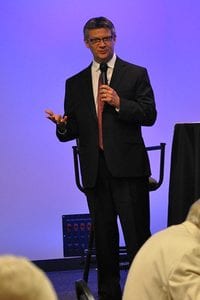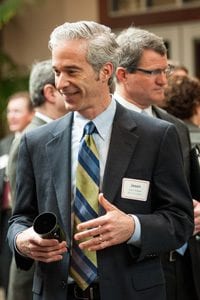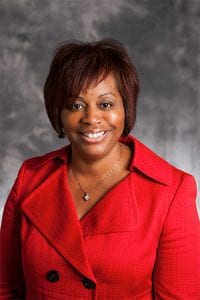
On this week’s podcast, Dr. Roebuck sits down with Senior Pastor of Nashville First Baptist Church Dr. Frank Lewis. In the continuing series of conversations about leadership, Dr. Lewis addresses the topic from the angle of a faith leader.

On this week’s podcast, Dr. Roebuck sits down with Senior Pastor of Nashville First Baptist Church Dr. Frank Lewis. In the continuing series of conversations about leadership, Dr. Lewis addresses the topic from the angle of a faith leader.
 Dr. Jon R. Roebuck, Exec Director
Dr. Jon R. Roebuck, Exec Director
It happened again. I got a letter this week from a company informing me that my personal data had been compromised. This time the company involved is a medical company that connects the dots between a medical provider who provides joint injections for knees, shoulders, etc., with the insurance companies. It works like this… when the doctor prescribes a procedure, this company is contacted to make inquiry of the insurance company to see if the procedure is covered. Apparently in order to make all of the necessary contacts, this “3rd party” has access to a patient’s medical record, name, address, social security number, etc. Because I had a history of knee injections (23 to be exact) prior to my recent bilateral knee replacement surgery, my personal data has been floating around this system. The recent letter stated the company’s belief that none of my medical records were compromised, but that everything else was at risk. They offered to provide a year’s worth of identity protection.
A few years ago, I got a similar letter when the data at Target was compromised. There was even a third incident a few months before that well-publicized incursion. I don’t even remember what company was involved, but my bank had a crazy time sending me new cards each time I was at risk. It’s a huge problem, right? So many of us have personal information stored with a number of so called, “secure” sites. And yet businesses and data banks are getting “hacked” with alarming regularity. It even happens in the cyber world. How many times have you received a message from someone you know that seems a little strange? And within minutes you get a “real” message from that friend saying that his/her email has been hacked.
It’s a scary thing to think that someone has stolen my identity, or yours. We don’t want people posing like us to take our money, ruin our credit scores, or bring upheaval to our lives. We don’t want anyone doing anything that in anyway falsifies who we are or brings potential shame upon our character. So why do we allow ourselves to steal the identity of Christ and use it fraudulently?
Consider this verse… Gal. 2:20, “I have been crucified with Christ; and it is no longer I who live, but Christ lives in me; and the life which I now live in the flesh I live by faith in the Son of God, who loved me, and delivered Himself up for me.” That verse teaches all of us as believers in Christ, that we no longer belong to ourselves. Our bodies, our hearts, our minds, and our motivations are now the property of Christ Himself. It is no longer we who live, but Christ who lives in and through us. So, we become His image before the world. We become His ambassadors. We become the standard bearers. Whenever we choose to act inappropriately, or with malice, or with hatred, or with prejudice, or with greed, we have to borrow His body to commit those deeds. We become the perpetrators of identity theft.
The problem is that most of us don’t think before we act. We don’t consider the rippling effects that are created whenever we misrepresent Christ. We live our lives, tweet our insults, Facebook our opinions, and voice our thoughts as if no one sees, hears, or reads what we say and think. We have segmented our lives into various categories. We have a faith/church life. We have a political life. We have a family life. We have a business life. We have a social media life. And somehow we think that it’s perfectly fine to live any one of those lives distinctively from the other lives. We forget that we have taken on the identity of Christ. His grace, His voice, His ethic, and His authority has to overarch all that we are and everything that we do. Whenever we fail to practice the belief that “Jesus is Lord,” we have committed the worst kind of identity theft. If we are going to claim Him as Lord, we must be willing to be claimed by Him.

Dr. Roebuck continues his leadership series with a discussion today with Dr. Jason Rogers. Dr. Rogers is the Vice President for Administration and University Counsel and has been with Belmont since 1998. Doctors Rogers and Roebuck talk about all of the roles that leaders play on a day-to-day basis.

Dr. Jon R Roebuck, Executive Director
I live in one of the fasting growing cities in America. By September of this year, Nashville, Tennessee will top the 1.9 million resident mark. In fact, each day, the population of Nashville increases by 82 residents. That’s 574 each week or roughly 2500 each month. Such stats might be frightening to some but exciting to others. Think about it… if you are in the real estate or construction business you have to think that the surge in population will mean a tremendous boost to your business. Fast food chains, car dealers, health providers and others will have to step up their game. So will the church. While most mainline denominations bemoan the downsizing of congregations, contributions, and influence, maybe they should be rejoicing at the opportunities that are about to knock at their doors. To be sure, the same old song and dance won’t lure new faces to church each week. Like everything else, the church will need to adapt radically. I’m not suggesting that we water down our theology or throw out all we know about ushering people into the presence of God. But there will have to be new strategies, new settings, new services, and new attitudes. The fields are white unto harvest… they are just not “mostly white” like they once were.
Since 2012, Nashville has had the fastest-growing immigrant population of any American city. 12% of the ever-growing population was born outside of the United States. It is home to the nation’s largest Kurdish population. Folks are coming to Nashville from places like Somalia, Burma, and Honduras. According to my friends at the Nashville Baptist Association, this past week, like every other week, worship happens across our city in 87 different languages. That statistic resonates with what Metro Schools has learned about its student population. Currently, 30% of students enrolled in Metro Schools speak a language other than English at home. (That’s 1 out of every three.) The ramifications for how we do church and how we engage our city as people of faith are enormous.
For years, the strategy has been helping others learn how to conform to our image. Maybe now we should think about the ways to conform our image into faces that are welcoming, engaging, and compassionate. We have to get to the point where we no longer demand uniformity of skin tone, hair color, clothing styles, or worship practices. We will learn how to become more multi-cultural, multi-ethnic, and multi-lingual or we will continue a slow fade into irrelevance. The world has come to us and we need to be ready. Rather than fear the change, we should rejoice in what God is doing.
Let me encourage you and your church to do at least three things.
First, take your family and go to a strange church where the majority of people don’t speak your language or share your ethnicity. Just go and worship one week. See how it feels to be the minority. Take on the experience of not understanding the language, the style of worship, or the cultural nuances. And as awkward as you feel, think about how you are expecting immigrants and refugees to suddenly embrace your home church as God’s gift to the world. You have to think like an outsider or you will never understand their worldview. And if you care about sharing the love of Christ with them, you will have to adjust and accommodate, even if doing so makes you uncomfortable. And by the way, a warm smile, a firm handshake, and a welcoming hug don’t demand Google translation to get the point across.
Second, when you have the opportunity to hire new staff, don’t hire to match current need, but future need. That will take some vision and courage on your part. One of my closest friends in ministry pastored a church in a rapidly transitioning section of Birmingham. The area around the church was in constant flux. The once all-white population soon became mixed racially. So, when the time came to hire a new youth minister, the church intentionally hired an African-American minister to reach kids in the neighborhood who were foundering without the love of Christ and the support of a two-parent home. When it came time to hire a new Music director, they went with a Hispanic guy because of the Latino population in the church field. It took a lot of courage and grace to make that happen. And my friend took a lot of grief along the way. But the church is alive and well today, and yes, it is very different in every way.
Third, consider the full embrace your congregation could offer an immigrant family. It’s easy to talk about welcoming the stranger in our midst. It is quite another thing to invest the time, energy, and resources it takes to make that happen. What if your church had the vision of making a difference in life of a least one immigrant family this year? What if you determined to make a difference… a real difference? What if you helped that family with housing and language skills? What if you helped them find a job and buy a car? What if you helped them find the path to citizenship and learned to converse with them in their native language? What if you helped them navigate the school system and provided all that the children needed to be successful in class? And… what if every church in the city did the same?
As you look ahead ask this simple question in terms of what God will do in our city… Will the Kingdom grow because of me, or in spite of me? The world is coming. We must be ready. Embrace the challenge.
 Dr. Jon Roebuck talks to Belmont University Vice President and Chief of Staff Dr. Susan West. Doctors West and Roebuck discuss what makes leaders tick and Dr. West’s journey to where she is today.
Dr. Jon Roebuck talks to Belmont University Vice President and Chief of Staff Dr. Susan West. Doctors West and Roebuck discuss what makes leaders tick and Dr. West’s journey to where she is today.

Dr. Jon Roebuck welcomes Belmont University Minister Heather Daugherty to the podcast. Jon and Heather talk about the roles of leaders and what makes an effective leader.

Dr. Jon R. Roebuck, Executive Director
It’s always a bit jarring that as soon as December 25th passes, we very quickly attempt to erase Christmas in a number of ways. First, we attempt to erase Christmas from our homes which have been so beautifully decorated for the season. Ornaments are placed back in their boxes, the lights are removed from the tree and rolled up for another year, the tree skirt gets folded, and the tree itself gets disassembled and stored away for another year. The wreath is taken from the front door and the nativity scene is packed away and placed on the top shelf of the closet once again. Every scrap of wrapping paper is tossed away and every cardboard box is flattened and taken to the curb for recycling.
Some debate about how long the decorations should remain in place. I have a friend who absolutely refuses to let any trace of Christmas remain when the calendar flips to the new year. I know others who just get around to un-decorating the house whenever the mood strikes. Last year, because of my recovery from double-knee replacement, some of our decorations stayed in place till mid-February. This year I resolved to do better. Most of our decorations and Christmas trees, yes trees with an “s”, were packed away before the dawning of the new year.
We also attempt to erase Christmas from our waistlines. Let’s all be really honest… most of us do not eat with a lot of discipline over the holidays. The cookies are too good to pass up. The homemade chocolate covered cherries can’t be allowed to go to waste. The Hawaiian rolls with ham and honey-mustard seemingly call out from the refrigerator. And so most of us start the new year with the resolve that we are going to do better. We dump the sweets and get on the treadmill as though we can erase two weeks of undisciplined eating in just 20 minutes of walking. By the way… have you had any of those Cheryl cookies? So good, right? My wife made an Orange pound cake this year. Needless to say, it’s long gone.
We even attempt to erase Christmas from our bank accounts. Because we tend to overspend a little, most of us get down-right cheap during the month of January. We scrimp and save every penny, vowing to erase the Christmas-caused deficit from our accounts. As quickly as we can, we attempt to act as though Christmas never even happened.
There is a special feeling that comes with Christmas… it’s a gentle grace, a sense of generosity, a spirit of benevolence and sharing that we don’t seem to experience during the rest of the year. During the Christmas season, we resolve to have more patience with long lines and weary salespersons. We give a little extra to organizations that help the poor and needy. We send cards to old friends. Somehow the Spirit of the Season just makes us a little better, a little more compassionate, maybe a bit more thoughtful. However, the problem with the Christmas Spirit is that we tend to pack it away with the decorations. The joy fades and the kind attitudes dissipate far too quickly.
Why does that happen? Why is Christmas erased so soon? Maybe it’s because of what we have done to Christmas. Rather than join in the sheer celebration of the Savior’s birth, we buy into a frenetic mentality that insists on making sure we have the right gifts, the right food on the table, or the right names of the card list. We’ve made Christmas into something that we must endure, rather than something we can’t help but enjoy. So, do better. Don’t pack away the Spirit of Christ with the rest of the decorations. Resolve to love with extravagance, give with generosity, forgive with abundance, and serve with great fervor. It’s what Jesus expects you to do, not just during the month of December, but every day of the year.